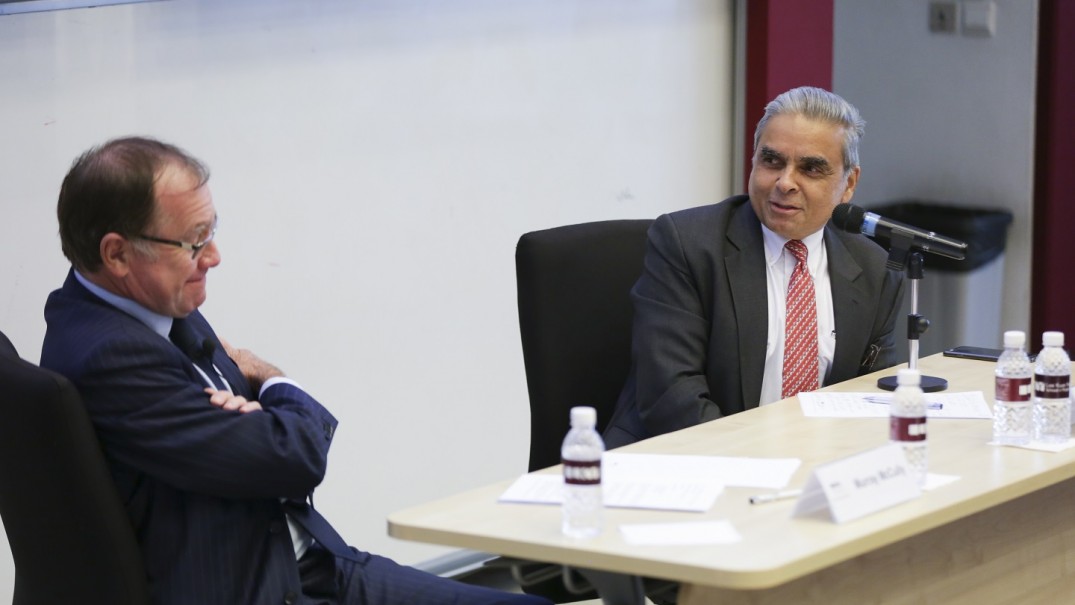
New Zealand’s Minister for Foreign Affairs Martin McCully and Dean Kishore Mahbubani having an in event discussion. Minister McCully gave his assessment of the UNSC, focusing on its engagement with small states and how it treats issues that concern them.
Small states outnumber big ones by far. Yet they have often complained that despite their majority, the United Nations Security Council (UNSC) is less responsive to their needs than to those of a handful of large, dominant players. Fortunately, the Forum of Small States (FOSS), an informal grouping established by Singapore in 1992 and currently led by New Zealand, is starting to address this imbalance.
On 9 March, New Zealand’s Minister for Foreign Affairs Martin McCully spoke at the Lee Kuan Yew School of Public Policy on his assessment of the UNSC, focusing on its engagement with small states and how it treats issues that concern them. Minister McCully, who has served in Parliament for 29 years and also held the posts of Minister for the Rugby World Cup and Minister for Sport and Recreation, expressed his concern that the general exclusion of small states from UNSC membership means that their security challenges do not receive the attention they merit.
Indeed, small states face special security challenges. Pacific Island states, for instance, are particular targets for transnational crime, via trafficking in drugs, arms and people. They may also be cut off from global trade and economic opportunity, creating a risk of political instability and conflict.
During its two-year term as a UNSC member, New Zealand has sought to raise awareness of these issues. It used its Council presidency to host a debate on security challenges in small island developing states in July 2015.
A new hope
LKYSPP Dean Kishore Mahbubani, who previously served as Singapore’s Ambassador to the UN, noted that he had formerly chaired the FOSS. Formed by Singapore in the early 1990s, the Forum is an informal grouping of states for countries with a population of fewer than 10 million. It now has over 100 members across the world, and members regularly come together to discuss issues, exchange ideas and coordinate positions.
However, the UNSC has been slow to pay attention. It is only recently that it has given states affected by its decisions the chance to address the Council. The concentration of power in the P5 – the Council’s five permanent members of the United States, China, Russia, United Kingdom and France – excludes smaller states. Reflecting on this, Prof Mahbubani joked that the 15-member UNSC really had “5 members and 10 observers.” Unfortunately, Minister McCully agreed that nothing much had changed.
Which way forward?
The P5 membership represents the winners of World War Two, not the balance of power in 2016. Both Prof Mahbubani and Minister McCully agreed the UNSC leadership should better reflect the world of today, rather than the world of 1945, with greater representation for small states.
However, they proposed different methods of achieving this. New Zealand has suggested a new class of UNSC membership for larger states that are not permanent members, which would give them the opportunity to earn a place on the Council.
On the other hand, Dean Mahbubani has put forward his 7-7-7 model of UNSC membership reform. He suggests there be seven permanent members largely reflective of the P5, seven semi-permanent members drawn from large regional powers and seven members elected from other UN member states.
However, Minister McCully believed the new class of membership should not be region-based. He argued that it would incentivise good behaviour if the new members needed to draw support from the wider UN membership, rather than through regional deals.
Regardless of the method chosen, the very existence of the FOSS and its growth over nearly 25 years indicate that the UNSC is failing small states and their security issues. Without reform to bring these to the forefront of Council activities, not only will dissatisfaction with the UNSC continue to grow, but, more importantly, major security challenges will be left unsolved.
References